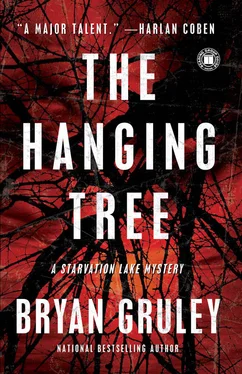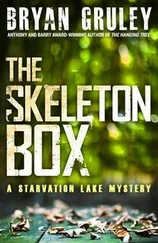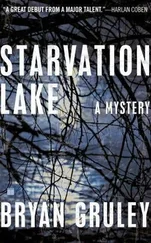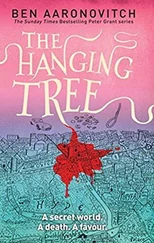Bryan Gruley - The Hanging Tree
Здесь есть возможность читать онлайн «Bryan Gruley - The Hanging Tree» весь текст электронной книги совершенно бесплатно (целиком полную версию без сокращений). В некоторых случаях можно слушать аудио, скачать через торрент в формате fb2 и присутствует краткое содержание. Жанр: Триллер, на английском языке. Описание произведения, (предисловие) а так же отзывы посетителей доступны на портале библиотеки ЛибКат.
- Название:The Hanging Tree
- Автор:
- Жанр:
- Год:неизвестен
- ISBN:нет данных
- Рейтинг книги:3 / 5. Голосов: 1
-
Избранное:Добавить в избранное
- Отзывы:
-
Ваша оценка:
- 60
- 1
- 2
- 3
- 4
- 5
The Hanging Tree: краткое содержание, описание и аннотация
Предлагаем к чтению аннотацию, описание, краткое содержание или предисловие (зависит от того, что написал сам автор книги «The Hanging Tree»). Если вы не нашли необходимую информацию о книге — напишите в комментариях, мы постараемся отыскать её.
The Hanging Tree — читать онлайн бесплатно полную книгу (весь текст) целиком
Ниже представлен текст книги, разбитый по страницам. Система сохранения места последней прочитанной страницы, позволяет с удобством читать онлайн бесплатно книгу «The Hanging Tree», без необходимости каждый раз заново искать на чём Вы остановились. Поставьте закладку, и сможете в любой момент перейти на страницу, на которой закончили чтение.
Интервал:
Закладка:
“I thought you don’t eat here no more.”
Stefan Bellissimo stood behind the counter in a white apron streaked with spaghetti sauce, hands on his hips, a butcher knife in one hand. Beneath the apron he wore a threadbare River Rats T-shirt. A hairnet mashed his black ringlets to his forehead. A ballpoint pen protruded from behind his ear. Flour powdered his thick eyebrows and mustache.
“Belly,” I said. “How are you, buddy?”
“Don’t give me that shit. You know what you did.”
The men’s hockey team I played on, the Chowder Heads, had for years ordered postgame pizzas from Belly’s joint. But I had finally persuaded our captain, Soupy, to switch to Gordy’s in Fife Lake. The pizza was better and Gordy usually threw in fried mushrooms.
“Hey,” I said, “I still bring Darlene in.”
“Darlene brings Darlene in. I’m one of your paper’s biggest customers. You can’t even bring your boys by?”
“What? One ad a week?”
“Look at that,” he said, pointing at his booths, where he used old Pilots as tablecloths.
“Ah. Well, I’m here. What’s good?”
“Don’t be pulling on my dick. The pizza’s good.”
I squinted over his head at the backlit menu on the wall. Belly had owned the place for something like ten years, in which time it had been called Zito’s, Sicoly’s, Fat Tony’s, Provenzana’s, Enzo’s, Mizzi’s and, for a time while he dated an Irish woman from Sandy Cove, Hickey’s. He kept changing the names, he said, for marketing reasons. The pizza stayed the same.
Today’s “Rats Special” was a grilled cheese sandwich with pepperoni. Too risky, I thought. Maybe a cold sub. Just $2.95 with chips. Pretty hard to screw up.
“What did Darlene have the other night?” I said.
“What she always has. Small Greek salad, ham-and-pineapple pie.”
“What about Gracie?”
“What?” Belly said. “You want food or not?”
I wanted to know what Gracie and Darlene had talked about there. The minute I had left Haskell, I’d forgotten about his little announcement and returned to the questions about Gracie swirling in the back of my mind: Why the fresh groceries if she’d planned to off herself? How did she manage to hang herself on a high branch without a ladder? What about the calendar with the dates crossed out in February but not January? Was she counting down the days till her death, and if so, why hadn’t she crossed off the final day? What about the single baby shoe left in her hiding place? And the key attached to the ribbon? Her ever-present Wings cap was hanging in the Zam shed; had she made a conscious decision to leave it behind? Or had she been forced to leave? And if so, why? Why would her worthless little life matter that much to anyone?
“Yeah, yeah,” I told Belly. “Italian sub, extra peppers.”
He waved the butcher knife around. “I’m not hearing a lot of enthusiasm.”
“You want me to sing?”
He put the heels of his hands against the countertop and leaned forward. Beads of sweat along the tops of his eyebrows glistened in the overhead light. “Let me ask you a question: You got a problem with us?”
“No problem,” I said. “I just happen to like Gordy’s-”
“Not that. That pissed me off but I mean like the whole thing. You got a problem with the whole town. It’s like we’re some bunch of fucking hooples who can’t do anything right, and you’re going to set us straight.”
“Hooples? What are you talking about?”
“You know what I’m fucking talking about. You know how much the game means to this place.”
Belly, who did not play hockey but attended every Rats game and supplied half-price pizzas for team functions, always referred to hockey as “the game,” in the same sort of bizarre sacred intonation that baseball freaks used about their tedious sport. I loved hockey, loved watching it, loved playing it most of the time. But love to me didn’t require reverence. It was just a game.
“What’s your point, Bel?”
He plucked the pen from behind his ear, a greenish order pad from an apron pocket. “My point is, why do you got to jam this guy up in the paper?”
“What guy?”
“The guy who’s building the rink. You seen his kid play yet? Patrick Roy rolled into Kenny Dryden.”
“The old rink’s not good enough for him?”
Belly slapped the order pad down on the counter. “Ain’t the point,” he said. “The point is, a new rink equals a new attitude-we can win. We ain’t had that around here. You of all people ought to know that. We’re like the goddamn Lions. No matter what we do, we lose because we think we’re going to lose. Something’s got to change to turn that around. This rink, the guy’s kid is our chance. Why do you have to fuck it up?”
I really hadn’t tried to fuck it up.
As a player, I was delighted to hear I’d be skating on a fresh sheet of ice and dressing in a room where my feet didn’t stick to the rubber-mat floors. As a reporter, I grew skeptical after two subcontractors left me late-night voice messages saying they had not been paid and Haskell wasn’t returning their calls.
I started stopping by the Pine County Courthouse every few days to see if any lawsuits had been filed against Haskell. Soon there were three. I wrote a fifteen-inch story and scheduled it for the front page, above the fold, where we had run earlier stories about the rink’s progress. I made repeated calls to Haskell and his attorney. They ignored me.
I was surprised to see the next morning that the story did not appear on the Pilot front page. Only later did I learn that Philo Beech, who’d been in meetings at headquarters in Traverse City, had read the story there and, without consulting me, decided to shorten it and move it to the bottom of page A6. When I asked him why, he explained that anybody could file a lawsuit and, without a response from Haskell, the story really wasn’t fair and balanced.
Philo was sitting with his boots up on his desk behind a two-day-old Wall Street Journal. I listened from my swivel chair across the room, speechless. What proof did we have, Philo said, that the subcontractors had actually completed the work they claimed to have completed? These disputes could just be run-of-the-mill contractual spats best left to the involved parties. At least the story hadn’t been killed outright, he said; I should be happy it had run at all. So blithe were his criticisms that I got the impression that he was relaying something he’d heard from someone else. He finally put the paper down and, for the first time in his little soliloquy, actually looked at me: Had I finished that feature on the outhouses-on-skis race that Sandy Cove was planning for the weekend?
I swallowed my pique, kept my mouth shut, and stayed on Haskell, sneaking calls and e-mails and half-day trips in between chamber of commerce press releases, school board meetings, and girls’ volleyball games. I combed through every local, county, and state file and database where I might find a reference to him, his Detroit firm, or any related business entity. There wasn’t much. I filed requests for documents under the Freedom of Information Act with four different state agencies. I wrote and e-mailed Haskell and his lawyer; I called Haskell at home at night; his lawyer threatened to sue us; Philo ordered me to stop calling.
I started driving past the construction site each morning before work. A cubical shell of rust-colored girders and columns had risen amid the mounds of mud and scrap and snow. Dump trucks and backhoes and bulldozers were parked around the site. I never saw them moving. I saw smatterings of workers on some mornings, none at all on others. I bought a disposable camera and, on four consecutive Fridays, drove to the site and from my truck window took four black-and-white photographs, one from each corner of the structure. I had them developed, shuffled them like playing cards, and left the stack one night on Philo’s desk chair.
Читать дальшеИнтервал:
Закладка:
Похожие книги на «The Hanging Tree»
Представляем Вашему вниманию похожие книги на «The Hanging Tree» списком для выбора. Мы отобрали схожую по названию и смыслу литературу в надежде предоставить читателям больше вариантов отыскать новые, интересные, ещё непрочитанные произведения.
Обсуждение, отзывы о книге «The Hanging Tree» и просто собственные мнения читателей. Оставьте ваши комментарии, напишите, что Вы думаете о произведении, его смысле или главных героях. Укажите что конкретно понравилось, а что нет, и почему Вы так считаете.












